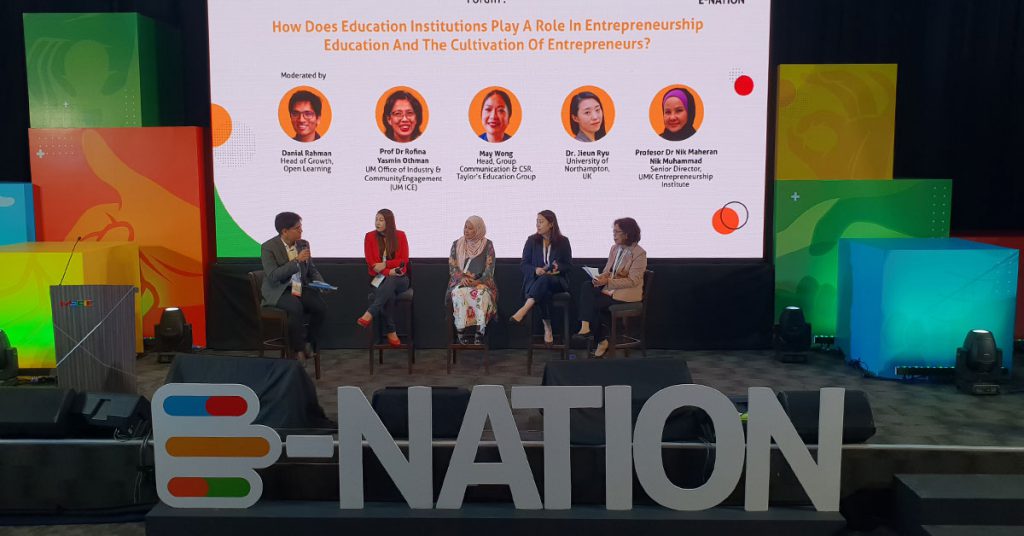This article series is in conjunction with Entrepreneurial Nation (E-Nation) Symposium, a 4-day event at MaGIC with the theme “Shaping An Entrepreneurial Nation”. The event will cut across 6 main pillars (Creative, Corporate Innovation, Education, Entrepreneurship, Policy and Social Entrepreneurship), with the objectives to:
1) Bridge ecosystem players together to exchange ideas, promote collaboration and foster networking opportunities;
2) Highlight recent entrepreneurial initiatives;
3) Gather influential entrepreneurs and speakers to share rich knowledge and information to attendees;
4) Promote the concept of social innovation and social responsibility to encourage the adoption and understanding of the conscious entrepreneurship concept.
This article is in line with the Education pillar.
How do educational institutions play a role in entrepreneurship education and the cultivation of entrepreneurs?
That was the question education industry leaders sought to answer during a panel discussion on day 2 of the E-Nation Symposium.
The panel moderated by Danial Rahman, the Head of Growth of Open Learning, included:
- Professor Dr Rofina Yasmin Othman, University Malaya Office of Industry and Community Engagement (UM ICE)
- May Wong, Head of Group Communication And CSR, Taylors University
- Dr Jieun Ryu, University of Northampton, UK
- Professor Dr Nik Maheran Nik Muhammad, University Malaysia Kelantan (UMK) Entrepreneurship Institute
Together, they shared how the educational sector is cultivating the next generation of entrepreneurs and how more can be done to spearhead its growth.
It Starts With The Teachers
“Do we have the right teachers to teach the next Mark Zuckerberg?” asked Danial, the moderator.
“You need entrepreneurs to teach entrepreneurs,” replied Prof Dr Yasmin.
In order to properly teach entrepreneurship, teachers need to understand entrepreneurship themselves, and the trials and tribulations that come with it.
While a PhD (which is the minimum requirement for most lecturer positions) is important, most teachers are ill-equipped to impart anything more than just technical know-how.
“It is not about technical knowledge but attitude, how to deal with failure. And for that, teachers need to be part of the [entrepreneurship] story,” said Prof Dr Yasmin.
This sentiment was echoed by most of the panel as they identified that there is a distinct lack of understanding on entrepreneurship in both educators and students.
MaGIC is working together with the campus community via the MaGIC Ecosystem Builder program. The program is a series of Train-the-Trainer programs aimed at training ecosystem builders, who shall be known as MaGIC Ecosystem Builders to facilitate innovation and entrepreneurship skills via running their own trainings, with the aim of scaling the number of entrepreneurs trained. To date, MaGIC has 19 universities that has collaborated with the program.
A Safe Place For New Ideas
But even with the right resources, educators often face resistance from both students and parents.
Parents often encourage their children to focus on studying hard and getting a good job. Anything outside that path is often considered a failure.
As Dr Jien Ryu explains, if you compare the mindset of a Western classroom and an Asian one, the difference is night and day.
Western students often speak their mind, discussing, and debating with one another, whereas Asian students put their head down and merely listen, afraid of stepping out of line.
The Asian mindset discourages being different or having new ideas, hallmarks of being an entrepreneur.
This is why schools should be actively turning themselves into safe space to encourage the free flow and test of ideas.
“These safe spaces create opportunities for students to face challenges, and learn to overcome failure, which instils resilience,” said Dr Jien Ryu.
For instance, UMK created BEEHIVE, an incubation and acceleration space for young entrepreneurs to do just that.
Communication And Collaboration
“To go fast, go alone. To go far, go together.”
African proverb
During the course of the panel discussion, the speakers surprised themselves on how similar their views and initiatives were.
This was especially true for the 3 university representatives that found that their programmes, research and even syllabus had similar goals in mind.
It led to a collective realisation that communication between like-minded educational institutions is severely lacking, as they could have been collaborating with one another instead of doing all this on their own.
May Wong said that more forums such as the E-Nation Symposium needed to happen more often to encourage collaboration between like-minded institutions.
This sentiment was echoed by Professor Dr Yasmin, which prompted them to jokingly announce that Taylors University and University Malaya may collaborate in the near future, having found so much in common with one another.
On that note, as Dr Jien Ryu pointed out, “Research should be emphasised.”
She also shared that much of the research has already been done, and it was just a matter of sharing the results with one another so all parties can use the data to improve the quality of teaching.
- You can read more on what we’ve written about MaGIC here.
